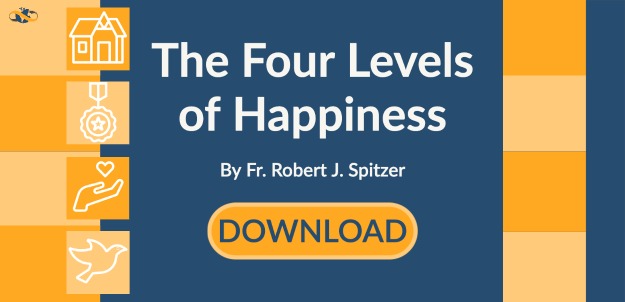Is there such a thing as “happiness”? If there is, why should we care?
The answer might surprise you.
Many people might dismiss the idea of “happiness'' as a fantasy or simply a preoccupation of “first world” western culture. Some might even view the notion with distrust: we are not meant to be happy in this world but in the next, right? But the empirical evidence is in. The ability to be happy or “content with life” leads to better physical and mental health, to better marriages, to better family and community relationships.
How does happiness make you a better person?
According to a study by Dr. Lyubomirsky and her colleagues, a positive sense of well-being (“happiness”) has many individual, family, and societal benefits. The authors cite multiple supporting studies revealing that happiness is significantly related to one’s physical and mental health. Additionally, the evidence indicates that “happy people are more likely to evidence greater self-control and self-regulatory and coping abilities."
"Also, happy people are not just self-centered or selfish; the literature suggests that happy individuals instead tend to be relatively more cooperative, prosocial, charitable, and 'other-centered.'" —Sonja Lyubomirsky, Kennon M. Sheldon, David Schkade (Pursuing Happiness: The Architecture of Sustainable Change)
Who wouldn’t want to be a positive influence in your family, workplace, and community?
The Role of Psychology in Understanding “Happiness”
A significant shift in psychology occurring in the last 20 years has produced multiple theories of subjective happiness, but considerations of “happiness” are not new. Aristotle first considered this idea of “eudaimonia” (thriving or happiness) in his Nicomachean Ethics (c. 340 B.C.). He linked “eudaimonia” with virtues or traits that promoted an optimal life, a life based on excellence.
Perhaps the best recognized of the current theories of happiness also recognizes the link to an optimal life. It is known as Positive Psychology, and its founders—Drs. Martin Seligman and Mihali Czikszentmihalyi—called for a major shift in the field of psychology in a special 2000 edition of the American Psychologist:
"The exclusive focus on pathology that has dominated so much of our discipline results in a model of the human being lacking the positive features that make life worth living.” —Martin E. P. Seligman & Mihaly Csikszentmihalyi (Positive Psychology: An Introduction)
Just what are those features that make life worth living?
"At the individual level, it is about positive individual traits: the capacity for love and vocation, courage, interpersonal skill, aesthetic sensibility, perseverance, forgiveness, originality, future-mindedness [sic], spirituality, high talent, and wisdom. At the group level, it is about the civic virtues and the institutions that move individuals toward better citizenship: responsibility, nurturance, altruism, civility, moderation, tolerance, and work ethic." —Martin E. P. Seligman & Mihaly Csikszentmihalyi (Positive Psychology: An Introduction)
The benefits of looking for positive aspects in one’s life and how to cultivate them are now well documented. For example, focusing on what we can be grateful for is currently a frequently recommended practice in both secular and religious circles. This truth, however, has been recommended for ages–literally. Consider this quote from St. John Chrysostom, a 4th century Church Father: "Happiness can only be achieved by looking inward and learning to enjoy whatever life has, but this requires transforming greed into gratitude."
So often, science confirms what philosophy or revelation has taught us already. This shouldn’t surprise us; the scientific method is only one way of investigating and understanding how the world works.
Increasing Happiness with Intentional Activity and Purpose
Investigating intentional activity and happiness in psychological research has yielded additional insights. We should not be surprised to learn that one of the ways to generate sustainable change in one’s level of happiness is “intentional activity.”
Going back to Lyubomirsky and colleagues, they highlight the critical role played by intentional activity in the process of change: choosing an activity based on interest and skills, then initiating and sustaining that activity. In addition, sometimes one has to endure boring or tedious activities for the sake of a future goal. What is the ultimate factor that makes this endurance possible?
[The] crucial factor in such cases is whether the person has internalized the non- enjoyable activity, that is, whether he or she is able to find meaning and value expression in it, even if it is not pleasant to perform. [Emphasis added] —Martin E. P. Seligman & Mihaly Csikszentmihalyi (Positive Psychology: An Introduction)
Far from being unimportant, finding purpose and meaning is crucial to the human project of living, a topic covered in an earlier blog post.
Stay tuned as we continue to explore the building blocks of happiness, especially meaning and purpose!
"Since happiness is nothing other than the enjoyment of the highest good, and since the highest good is above, no one can be happy unless he rises above himself, not by an ascent of the body, but of the heart." —St. Bonaventure


